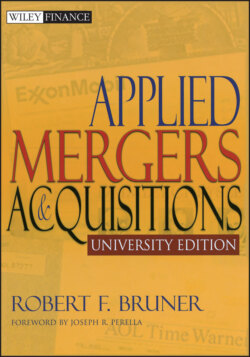Читать книгу Applied Mergers and Acquisitions - Robert F. Bruner - Страница 102
Exploit Market Imperfections
ОглавлениеA venerable stream of research in economics suggests that foreign direct investment through cross-border acquisition seeks to take advantage of market imperfections and failures8 in foreign countries. The theory is that the buyer will recognize profitable opportunities to take advantage of cheap labor and raw materials, unmet consumer demand, deregulation, trade liberalization, and country integration of capital and product markets into global markets. Exhibit 5.4 presents a list of 17 large cross-border deals from 1997 to 2002. The forces of change are evident in the makeup of this list:
Telecommunications. Seven of the 17 deals originate in the telecommunications industry and suggest these forces at work: rapid technological change and government deregulation. Vodafone/Mannesmann and Vodafone/AirTouch, both in the wireless segment of the industry, are notable for their size. Also, Vodafone initiated one of the few hostile offers ever to occur in Germany—and won.
Pharmaceuticals/chemicals. Rising R&D expense and the desire to achieve distribution economies motivated the Astra/Zeneca and Hoechst/Rhône-Poulenc deals.
Consumer foods. Two deals (acquisitions of BestFoods and BAT Industries) were driven by the desire for portfolio diversification across product categories, perceived benefits of global branding, perceived undervaluation of brands in the home capital markets, and an expectation of greater economies of scale in distribution.
Automobiles. Rising new product development costs and the consequent consolidation in the industry motivated the combinations of Daimler/Chrysler, Ford/Volvo, and others.
In short, the surging volume in cross-border M&A is driven by the many of the same fundamental economic forces outlined in Chapter 4. From this perspective, cross-border M&A activity is not a curious sideshow to the large domestic U.S. volume, but is sizable and linked integrally with it.
